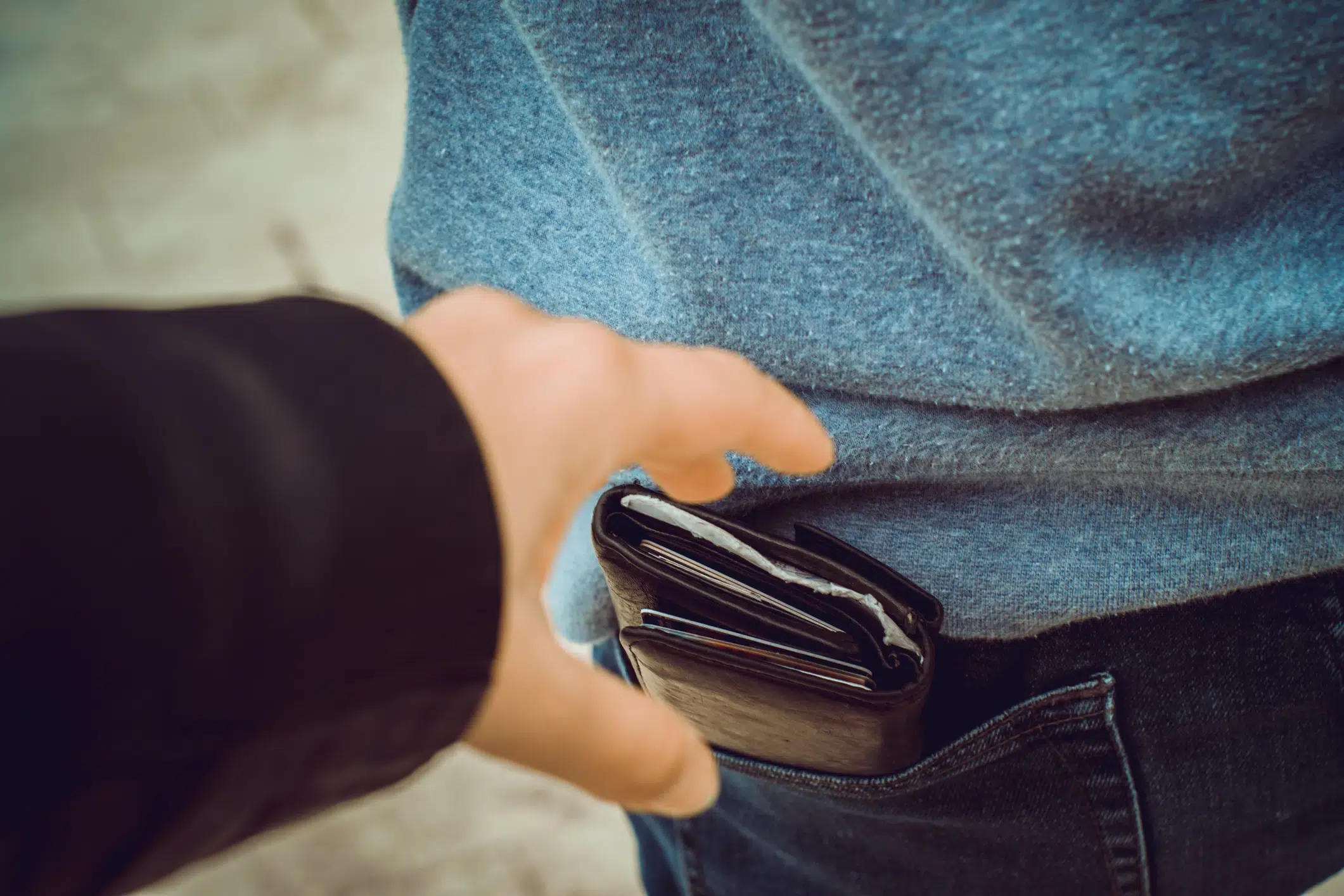Understanding Theft Crimes in Virginia
In Virginia, theft crimes are primarily categorized as larceny, robbery, and burglary, each with distinct definitions and penalties based on the circumstances and value of the stolen property.
For example, larceny is the unlawful taking of another person’s property without their consent, with the intent to deprive them of it permanently. It includes shoplifting, embezzlement, and fraud. Petit larceny involves the theft of property worth less than $1,000.
Shoplifting is a type of larceny that involves concealing or taking goods from a store without paying for them. It is petit larceny if the value is under $1,000, and felony grand larceny if the value is $1,000 or more.
A conviction in Virginia for any theft crime, whether a felony or misdemeanor, can result in jail time, fines, and a permanent criminal record.
A skilled theft defense attorney in Virginia is crucial for obtaining the best possible outcome in your case, as Virginia law is stringent. Attorney Scott Nolan has helped thousands of Virginians have their charges reduced or dismissed for offenses such as petit larceny, felony grand larceny, and theft valued at less than $1,000, among others.

Petit Larceny and Misdemeanor Theft Offenses
In Virginia, petit larceny is defined as the unlawful taking of another person’s property valued at less than $1,000, or less than $5 if taken directly from a person with the intent to deprive the owner of it permanently.
It is classified as a Class 1 misdemeanor, punishable by up to 12 months in jail and/or a fine of up to $2,500. Common examples include shoplifting items valued at under $1,000, stealing personal belongings, or committing minor theft of services. A notable feature of petit larceny is the “three-strikes” rule: a third conviction, even for petit larceny, can be charged as a Class 6 felony, carrying a potential sentence of up to five years in prison.
Defenses may include lack of intent, mistaken identity, or disputing the property’s value to avoid escalation to grand larceny. First-time offenders may be eligible for a deferred disposition, where completing probation can result in the case being dismissed without a finding of guilt.
A skilled Virginia theft attorney, such as Scott Nolan, can review your case during a free consultation today to determine if your charges under Virginia law can be dismissed or reduced, or whether you may qualify for pretrial diversion.

Grand Larceny and Felony Theft Charges
In Virginia, grand larceny is a serious felony offense defined as the unlawful taking of another person’s property valued at $1,000 or more, $5 or more if taken directly from a person (e.g., pickpocketing), or any firearm regardless of value, with the intent to deprive the owner of it permanently.
Grand larceny is an unclassified felony, punishable by one to 20 years in prison, or at the court’s discretion, up to 12 months in jail and/or a fine of up to $2,500. Examples include stealing high-value items, such as electronics, jewelry, or vehicles, or shoplifting merchandise worth $1,000 or more. The severity of the charge is based on the property’s value, which prosecutors must prove, often through receipts or appraisals.
Defenses may include disputing the property’s value to reduce the charge to petit larceny, arguing lack of intent, or claiming ownership rights. A grand larceny conviction is considered a crime of moral turpitude, resulting in severe consequences, including a permanent criminal record, loss of employment opportunities, and potential immigration issues. A third larceny offense, even if prior convictions were for petit larceny, can also be charged as a felony, resulting in increased penalties.
Felony Theft Charges
Felony theft charges in Virginia may include grand larceny and other serious theft-related offenses, such as organized retail theft, some instances of receiving stolen goods, or computer fraud involving services with a value of $2,500 or more.
For instance, organized retail theft, which involves stealing retail property worth over $5,000 within 90 days with the intent to sell, is a Class 3 felony, carrying a sentence of five to 20 years in prison and fines of up to $100,000. Additionally, receiving stolen goods valued at $1,000 or more, with knowledge of their stolen status, is considered grand larceny.
Felony theft charges carry more severe penalties than misdemeanors and have lasting consequences, including restrictions on firearm ownership, professional licensing, and security clearances.
Defenses often focus on challenging the prosecution’s evidence of value, intent, or knowledge, or highlighting procedural errors. Given the severe consequences, including potential mandatory minimum sentences under Virginia’s three-strikes rule for repeat offenders, consulting an experienced criminal defense attorney, such as Scott Nolan, is vital for a favorable case outcome.
Stolen Goods, Shoplifting & Related Offenses
Virginia law also criminalizes receiving stolen goods. The offense is classified based on the value of the property: if the goods are valued at less than $1,000, it is a Class 1 misdemeanor, punishable by up to 12 months in jail and/or a fine of up to $2,500. If the value is $1,000 or more, or includes any firearm regardless of value, it is grand larceny, an unclassified felony punishable by 1 to 20 years in prison, or at the court’s discretion, up to 12 months in jail and/or a $2,500 fine.
Shoplifting
Shoplifting involves intentionally taking or concealing goods from a retail establishment without paying, with the intent to permanently deprive the merchant. Concealment alone, such as hiding an item in a bag, is sufficient evidence of intent to steal.
Shoplifting is charged as petit larceny if the goods are valued at less than $1,000, punishable by up to 12 months in jail and/or a $2,500 fine, or as grand larceny (unclassified felony) if valued at $1,000 or more, carrying 1 to 20 years in prison or lesser penalties at the court’s discretion.
Beyond criminal penalties, shoplifters can face civil liability, which requires payment of twice the item’s retail value (or $50, whichever is greater) plus the store’s legal fees, up to $150. A third shoplifting conviction escalates to a Class 6 felony.
Defenses include proving lack of intent, disputing the item’s value, or challenging evidence of concealment. First-time offenders may be eligible for deferred disposition, which could potentially result in the case being dismissed upon completion of probation. However, a conviction can harm professional and personal opportunities.
Proven theft defense attorney Scott Nolan can provide numerous strong defenses to stolen goods and shoplifting charges, including contesting intent, value assessments, and the chain of custody of evidence.
Building a Strong Defense Against Theft Charges
Facing theft charges in Virginia, whether for petit larceny, grand larceny, shoplifting, or receiving stolen goods, requires a strategic defense to mitigate penalties and protect your future. The prosecutor must prove that you intended to permanently deprive the owner of the property, which is often fertile ground for a robust defense.
Potential Defenses
A strong defense begins with engaging an experienced criminal defense attorney familiar with Virginia’s theft laws, such as Attorney Nolan. He will assess your case details, identify prosecutorial weaknesses, and challenge evidence like property value, which is critical since values of $1,000 or more elevate petit larceny to grand larceny.
Other defenses include proving lack of intent to permanently deprive the owner, which is essential for larceny convictions. For example, in shoplifting cases, demonstrating that concealment was accidental or that payment was intended can weaken the prosecution’s case.
Procedural errors, such as improper searches or arrests, can also result in the suppression of evidence or the dismissal of a case. First-time offenders may pursue deferred disposition, potentially avoiding a conviction through probation, but this requires careful negotiation by your defense attorney.
Additional Defense Strategies and Considerations
Beyond challenging intent or procedure, defenses may involve disputing the prosecution’s valuation of stolen property, particularly in cases involving grand larceny or organized retail theft. To avoid liability for receiving stolen goods, it is vital to prove that you were unaware of the items being stolen, as knowledge is a required element.
Ownership disputes, where you believed you had a rightful claim to the property, can also be compelling. Virginia’s “three-strikes” rule escalates a third larceny offense to a Class 6 felony, making it crucial to challenge the validity of prior convictions if applicable.
Attorney Nolan may attempt to negotiate a plea deal to reduce felony charges to misdemeanors or secure alternative sentencing, like community service. Theft convictions, considered crimes of moral turpitude, significantly impact employment, housing, and immigration status, making it essential to build a robust defense.
Why Hiring a Virginia Theft Lawyer Matters
Virginia’s theft laws are complex, and the penalties for conviction are severe. Thus, it’s vital to your future to retain a skilled Virginia theft attorney like Attorney Nolan immediately. He will help you understand the charges against you, your legal options, and possible resolutions.
Legal Skill and Experience Are Vital
Attorney Nolan understands the nuances of state laws regarding theft and can craft a tailored defense to challenge charges that carry penalties ranging from up to 12 months in jail and $2,500 fines for misdemeanors to 1–20 years in prison for felonies.
He will evaluate evidence, such as property valuations or proof of intent, which are critical in determining whether a charge is a misdemeanor (under $1,000) or a felony (over $1,000). For instance, in shoplifting cases. Attorney Nolan could argue for accidental concealment or a lack of intent to steal, potentially reducing or dismissing the charges.
He also knows how to address the state’s “three-strikes” rule, where a third larceny offense escalates to a Class 6 felony, and can challenge prior convictions to prevent harsher penalties. By identifying procedural errors, such as improper searches, or negotiating deferred dispositions for first-time offenders, Attorney Nolan can minimize or avoid convictions, thereby protecting your record and future.
Long-Term Benefits of Legal Representation
Beyond immediate case outcomes, hiring a Virginia theft lawyer like Scott Nolan safeguards your long-term interests, as theft convictions are considered crimes of moral turpitude, which can impact employment, housing, professional licenses, security clearances, and immigration status. A lawyer can negotiate plea deals to reduce felony charges to misdemeanors or secure alternative sentencing, such as community service, to lessen collateral consequences.
For example, in cases involving the receipt of stolen goods, proving a lack of knowledge that the items were stolen is complex and requires legal expertise to present effectively. Attorney Nolan also handles civil liabilities, like shoplifting penalties, which include paying twice the item’s value plus legal fees. By gathering evidence, such as receipts or witness statements, and advising against self-incriminating statements to police, your dedicated theft defense lawyer builds a robust defense.
Fairfax Theft Defense Lawyer FAQs
Theft in Virginia includes taking someone else’s property without permission with the intent to permanently deprive them of it. This can include shoplifting, embezzlement, or stealing personal belongings.
Penalties depend on the value of the stolen property and can include fines, restitution, probation, and imprisonment. Higher-value thefts are classified as felonies with more severe consequences.
Misdemeanor theft typically involves property valued below a certain threshold (usually under $1000), while felony theft involves higher-value property or repeat offenses, leading to harsher penalties.
A first offense defense may focus on negotiating reduced charges, diversion programs, or probation instead of jail, especially when the value of stolen property is low and the defendant has no prior record.
Fighting a theft charge involves challenging the evidence, questioning witness credibility, presenting an alibi, or negotiating with the prosecutor to reduce or dismiss charges.
Evidence may include surveillance footage, witness statements, receipts proving ownership, character references, or documentation showing lack of intent to steal.
The arrest process typically includes being taken into custody, booked, and arraigned in court. Bail may be set, and a court date scheduled for trial or plea negotiations.
Yes. Courts often require defendants to repay the value of stolen property to the victim, in addition to fines or other penalties, as part of restitution.
A theft conviction becomes part of your criminal record, potentially impacting employment, housing, and professional licenses. The severity depends on whether it is a misdemeanor or felony.
Plea options may include pleading guilty, not guilty, or negotiating a plea deal with reduced charges or alternative sentencing like probation or diversion programs.
Yes. A skilled theft defense lawyer like Scott Nolan can protect your rights, evaluate evidence, negotiate with prosecutors, and build a strong defense strategy.
In some cases, theft charges can be reduced to a lesser offense or dismissed entirely, particularly for first-time offenders or when evidence is insufficient.
You are generally required to appear at your arraignment or respond to court orders promptly. Missing these deadlines can result in additional penalties or a warrant for your arrest.
Common defenses include lack of intent, mistaken identity, consent from the property owner, or procedural errors by law enforcement.
Scott Nolan can analyze your case, gather evidence, negotiate with prosecutors, represent you in court, and work to reduce or eliminate penalties while safeguarding your rights.


